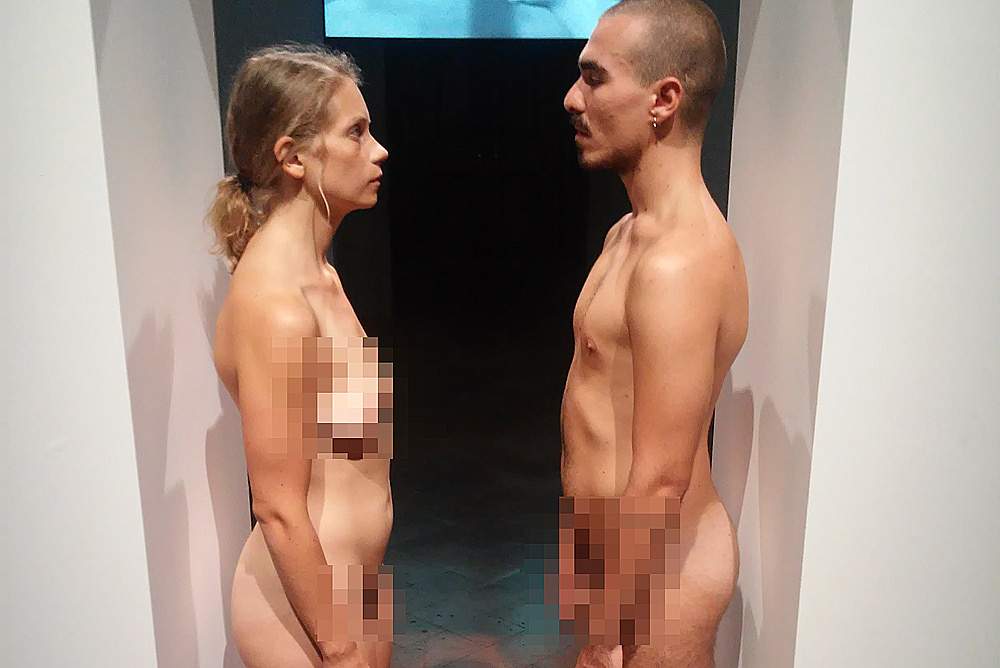While the major Marina Abramović exhibition is underway in Florence at Palazzo Strozzi , censorship rages on Facebook against users who post photos of remakes of the Serbian artist’s performances: as is well known, the exhibition in fact includes moments in which Marina Abramović’s actions are recreated by artists and actors, and since many of these actions involve nudity, the axe of social censorship has fallen and continues to fall on anyone who dares to post these images online.
The case has now landed in Parliament: the Honorable Gabriele Toccafondi, a deputy from the Mixed Group, submitted a parliamentary question for written answer on October 30 addressed to the Minister of Cultural Heritage, Alberto Bonisoli, to ask him if he is aware of the matter. Below is the full text of the question:
"To the Minister for Cultural Heritage and Activities. - To know - WHEREAS:
Palazzo Strozzi, an extraordinary Renaissance stately home dating back to the 1500s, is now home to the Strozzi Foundation: the city of Florence, the province, the chamber of commerce and private partners are united to create a public-private company to manage and make the most of Palazzo Strozzi through the organization of exhibitions and cultural events;
270 thousand annual visitors in 2017 and an impact of 33 million euros, a true record, confirm the importance of this location for Florence;
from September 21, 2018 to January 20, 2019, under strong encouragement from Mayor Nardella, Palazzo Strozzi is hosting a major exhibition dedicated to Marina Abramović, one of the most celebrated personalities in contemporary art, whose works have revolutionized the idea of performance by challenging her own body, its limits and potential for expression;
Abramović, a Serbian artist, has received major honors during her lifetime, including the “Medal for Science and the Arts” (Austria, 2008), the Golden Lion, XLVII Venice Biennale (1997), the Niedersächsischer Kunstpreis (2003), the New York Dance and Performance Award (The Bessies, 2003), the International Association of Art Critics, Best Show in a Commercial Gallery Award (2003), and the “Lorenzo il Magnifico” Lifetime Achievement Award, 8th Florence Biennale (2009);
the event at Palazzo Strozzi, titled “The Cleaner,” stands as an extraordinary retrospective that brings together more than 100 of the artist’s works, offering an overview of the most famous works of his career, through videos, photographs, paintings, objects, installations and the live re-enactment of his celebrated performances through a group of specifically trained and selected performers;
of course, the questioner also assesses “Imponderabilia,” as one of the most celebrated performances in contemporary art history: through nudity, Abramović wishes to probe human behavior;
“Imponderabilia” sees the audience forced to enter the museum, past the naked bodies of two artists; the space is very narrow and the visitors do not have the possibility to pass by, looking straight ahead, but they have to choose whether to turn towards the man or the woman: therefore, the visitor is faced with a dilemma, and does not imagine that he or she will suddenly become the main actor of the event. This “discomfort,” this laying bare of one’s instincts and emotions, and thus becoming a protagonist itself in the performance is for the questioner exactly Abramović’s goal;
great praise expresses the questioner, therefore, to the Florentine municipal administration, which after other great contemporary artists such as Bill Viola and Ai Weiwei, decides today to bet on Abramović: an extraordinary city like Florence, uniquely linked to the past through its works and palaces, which wishes to dialogue with the present and through world-renowned artists such as Abramović;
therefore, we are dismayed by the decision that appears to have been taken by some social networks, including Instagram and Facebook, to block videos and photos posted by art lovers regarding precisely the Palazzo Strozzi exhibition that has just opened;
it represents a collective interest to urgently demand answers from the social networks called in question, which, in fact, represent an obstacle to the dissemination of art, communication and therefore also tourist flows related to such performances; in addition to placing emphasis on the defense of freedom of artistic expression, regardless of personal tastes on such performances, which must always be protected -:
whether the questioned Minister is aware of the above facts and whether he considers it appropriate to take any initiative within his competence, including through an information campaign, aimed at promoting and protecting freedom of artistic expression."
 |
| Facebook censorship case over Marina Abramović exhibition in Florence lands in Parliament |
Warning: the translation into English of the original Italian article was created using automatic tools. We undertake to review all articles, but we do not guarantee the total absence of inaccuracies in the translation due to the program. You can find the original by clicking on the ITA button. If you find any mistake,please contact us.